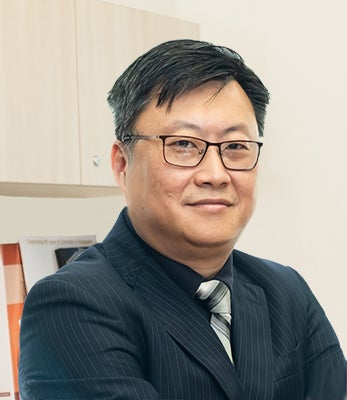

Professor Wee Han Ang
Faculty & Department
Joint Appointments
Vice Dean, Dean's Office (science), Science
Associate Provost, Masters' Programmes & Lifelong Education, Office Of The Provost
Professor, Integrative Sciences and Engineering
Vice Dean, Dean's Office (Science), Science
Associate Provost (NUS Multidisciplinary & Interdisciplinary Masters' Programmes, Masters' Programmes and Lifelong Education, Office of the Provost
Vice Dean (Academic Programmes Office), Academic Programmes Office, School of Continuing And Lifelong Education
Education
Doctor of Philosophy, Ecole Polytechnique Federale De Lausanne, Switzerland
Bachelor of Science (Chemistry) Hons Class 1, Imperial College London, United Kingdom
Bio
Prof Ang is a Professor of Inorganic Chemistry at the National University of Singapore (NUS). An alumni of the Chinese High School and Hwa Chong Junior College, he graduated from Imperial College London in 1995 with BSc (Hons) First Class under the Singapore Armed Forces Merit Scholarship. He went on to serve in the Republic of Singapore Navy as a Naval Combat Officer and was honourably discharged in 2003 after 8 years of service. He chose to return to academia to pursue his PhD studies at Ecole Polytechnique Federal de Lausanne, Switzerland till 2007 and won the EPFL Doctorate Prize in 2008 for best doctoral thesis for his PhD cohort. He was also awarded the NUS Overseas Postdoctoral Fellowship (NUS-OPF) to pursue his postdoctoral research stint at the Massachusetts Institute of Technology. He joined NUS in 2009 to embark on his independent academic career and has been there since.
Prof Ang’s current research lies at the intersection of inorganic chemistry and biology, and he is actively investigating new metal-containing compounds for use in cancer therapy and as targeted antibiotics. He is also passionate about the study of trace metals and their roles in flavour science, having co-founded a start-up company developing alternative protein products with meat-like flavours. Prof Ang is currently holding concurrent management appointments as an Associate Provost and Vice-Deans at NUS. He also is the Chairperson of the Advisory Committee on Hazardous Substances and Toxic Waste under the National Environmental Agency and represents Asia on the Executive Committee of the Society of Biological Inorganic Chemistry.
Contact Information
Clinical Success of Platinum Drugs and their Limitations
The serendipitous discovery by Barnett Rosenberg that cis-diamminedichloroplatinum(II), more commonly known as cisplatin, can inhibit the tumour growth heralded a new era of cancer research based on metallopharmaceuticals. To date, cisplatin and its analogues are some of the most effective chemotherapeutic agents in clinical use and are used against a variety of malignancies including, colorectal, lung, testicular and ovarian cancers. The anticancer properties of this simple inorganic compound are remarkable, particularly against testicular cancer.
Prior to the introduction of cisplatin, testicular cancer was a deadly disease for men with high mortality rates of approximately 70%. Platinum-based chemotherapy has dramatically reversed this trend, with curative rates exceeding 90% in early stage cases. Carboplatin is a second-generation platinum drug against a similar spectrum of cancers but with lower toxicities. Oxaliplatin was approved for clinical use as recently as 2003 and used in combination with 5-fluorouracil against advanced metastatic colorectal cancers.

FDA-approved Platinum(II) Anticancer Drugs
The cytotoxic action of these compounds requires a combination of processes including cell entry, drug activation, DNA binding and cellular responses. Upon cell entry, the platinum drugs are activated by aquation and bind nuclear DNA. Formation of platinated DNA adducts lead to arrest of key cellular functions, such as transcription, and triggers a variety of cellular responses, such as repair. However, several challenges in the clinical application of these platinum-based chemotherapies remain, including their high toxicity, severe side-effects and incidence of drug resistance. Furthermore, despite the tremendous amounts of resources invested into developing new platinum drugs over the past few decades, but there have only been only few successes. These challenges have spurred renewed interest in uncovering new metallodrugs for cancer therapy.
Current Research Interests
Our research interest lies at the interface of chemistry and biology, in the study and development of metallocomplexes for targeted cancer therapy. Our work focuses mainly on Pt- and Ru-based complexes as non-classical therapeutic agents and elucidating their modes of action. We are also actively pursuing fluorescence probes that would allow us to investigate these compounds in live cell models. Our 4 broad areas of research are:
1) Developing the chemistry of platinum(IV) carboxylates as anticancer prodrug complexes
3) Metallocomplexes as Immuno-Chemotherapeutic agents
4) Coordination-directed 3-component Assembly of ruthenium-arene complexes for drug discovery
My Mentoring Style
How would you describe your mentoring style in terms of freedom given to your students?

Selecting Research Topics?
How do you guide your PhD students in selecting research topics?

Setbacks / Challenges
How do you handle setbacks or challenges faced by your PhD students?

Feedback
How do you give feedback on your students’ thesis drafts and progress?

Consultation Frequency
How often do you typically meet your PhD students one-on-one for consultation?

Research Group Meetings
How often do you typically hold lab meetings where your PhD students present their research work to the class?

I believe in cultivating a strong relationship with my students, even after they have graduated from my group. We have regular meet-ups and gatherings, and I see myself as a dependable mentor whom my students, past and present, can rely on.

